Key takeaways:
- Key data ethics principles include transparency, consent, accountability, and fair use, emphasizing the need for individuals to understand their data rights.
- Legal frameworks like GDPR and CCPA establish guidelines for data usage, highlighting the importance of user consent and protection across different jurisdictions.
- Ethical challenges in data handling involve informed consent, data breach risks, bias, misuse, and respecting user autonomy, requiring a deep sense of responsibility from data stewards.
- Promoting transparency in data processes fosters trust, necessitating clear communication about data collection methods and algorithmic decisions to prevent misunderstandings and bias perceptions.
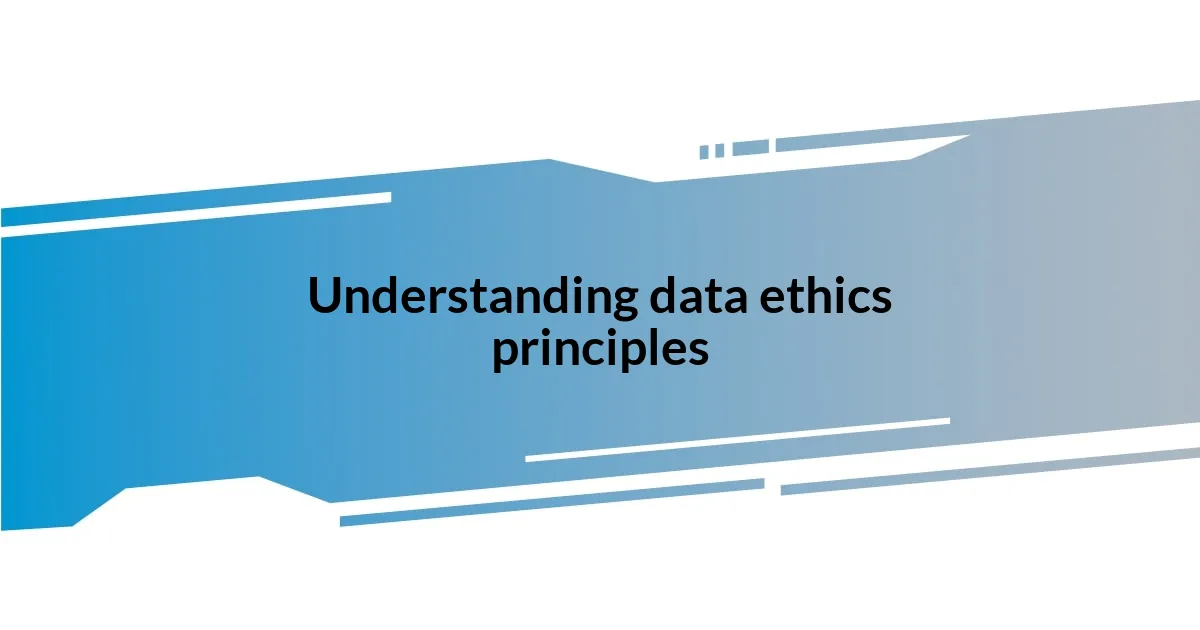
Understanding data ethics principles
When we dive into data ethics, principles like transparency, accountability, and privacy come to the forefront. I remember a project where we analyzed customer patterns, and I found myself grappling with whether customers were fully aware of how their data was used. It made me wonder—shouldn’t consumers have a clear understanding of how our insights shape their experiences?
Another fundamental principle is consent. I once attended a seminar where a speaker highlighted how users often unwittingly consent to data usage through lengthy terms and conditions. It struck me how this can create a disconnect between users and their data rights. Are we truly respecting individuals’ autonomy if they’re not fully informed about what they’re agreeing to?
Lastly, fair use is crucial. I’ve seen organizations misuse data, often leading to discrimination inadvertently. This makes me question: How can we, as data stewards, ensure equitable treatment for all? Embracing fair practices not only builds trust but also reinforces our responsibility toward the communities we serve.
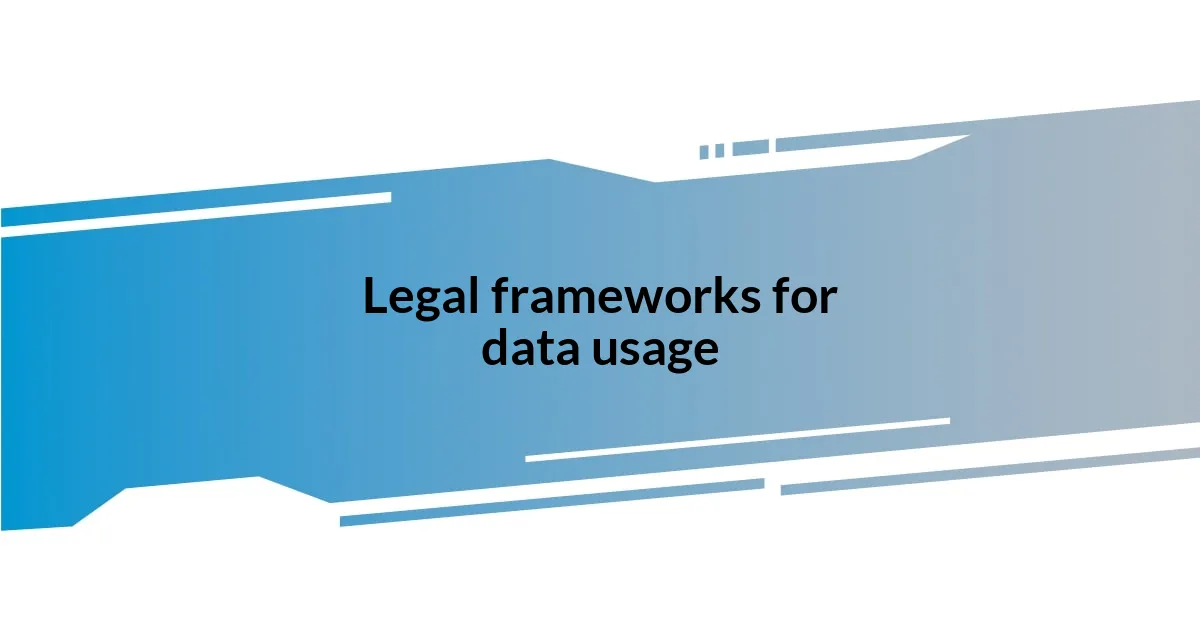
Legal frameworks for data usage
Legal frameworks governing data usage are crucial for establishing responsible practices. Laws like the General Data Protection Regulation (GDPR) in Europe emphasize the importance of user consent, tailor-made for modern digital interactions. I recall working with a client on data management, and the difference in compliance standards between regions became strikingly clear—what was acceptable in one jurisdiction was a legal minefield in another.
In the U.S., the landscape gets more complex with a fragmented approach, as there is no overarching federal law similar to GDPR. Instead, states have their own regulations, like the California Consumer Privacy Act (CCPA). I remember a conversation with a colleague who was perplexed by how adapting to various regulations took significant time and resources. It begs the question: how can we streamline compliance without compromising our ethical standards?
Ultimately, these legal frameworks not only serve as guidelines but also reflect the ethical responsibilities of organizations. I often think about the growing public awareness of data privacy, and it’s evident that the pressure for transparency and accountability will only increase. How do we position ourselves to meet these expectations while embracing innovation?
| Framework | Key Focus |
|---|---|
| GDPR | User consent and data privacy |
| CCPA | Consumer rights and protection |
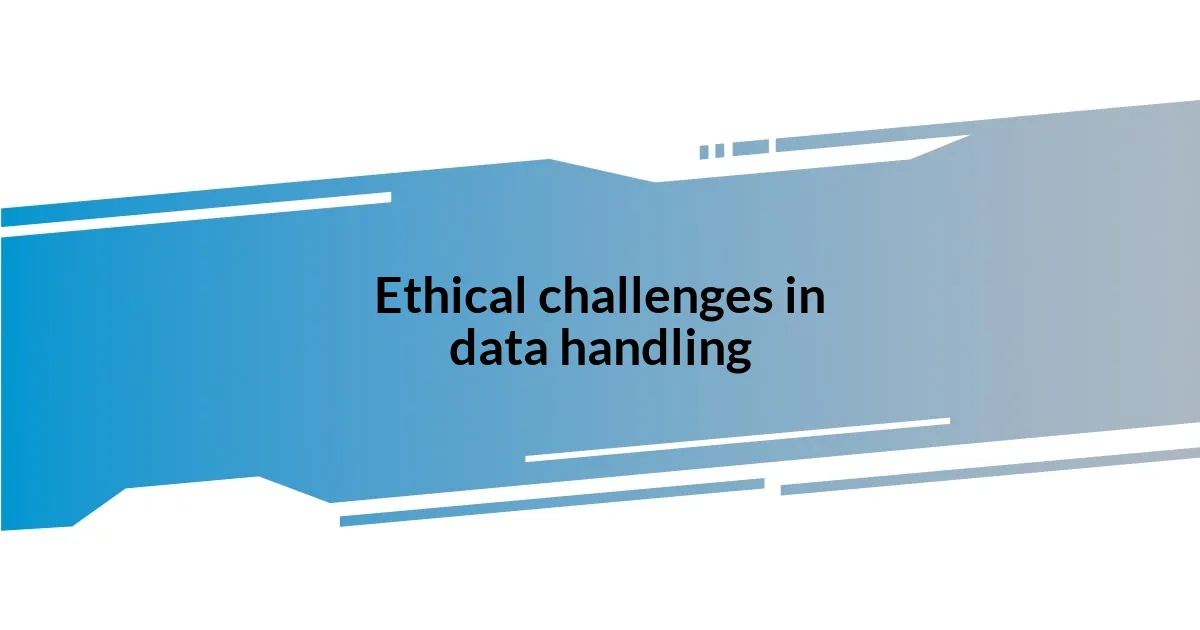
Ethical challenges in data handling
Navigating the ethical challenges in data handling can feel like walking a tightrope. One moment, I’m deep in analysis, uncovering trends, and the next, I’m confronted with the moral ramifications of my findings. I recall a time when I stumbled upon sensitive information during a data audit. I was left questioning the ethical implications of my access to this data and whether it should have ever been collected. It highlighted an uncomfortable truth: just because we can do something with data doesn’t mean we should.
Here are some ethical challenges that often arise in data handling:
– Informed Consent: Are individuals truly aware of what they’re consenting to?
– Data Breach Risks: How do we safeguard personal information from unauthorized access?
– Bias in Data Collection: Is the data truly representative, or does it perpetuate systemic biases?
– Misuse of Data: Are we prepared for the consequences if data is used in ways that harm individuals or groups?
– User Autonomy: Do we respect individuals’ rights to control their own data?
Each challenge brings with it a weight of responsibility I feel deeply as a data steward. The stakes are high, and I often reflect on how my decisions resonate beyond the screen, impacting lives and trust in organizations.
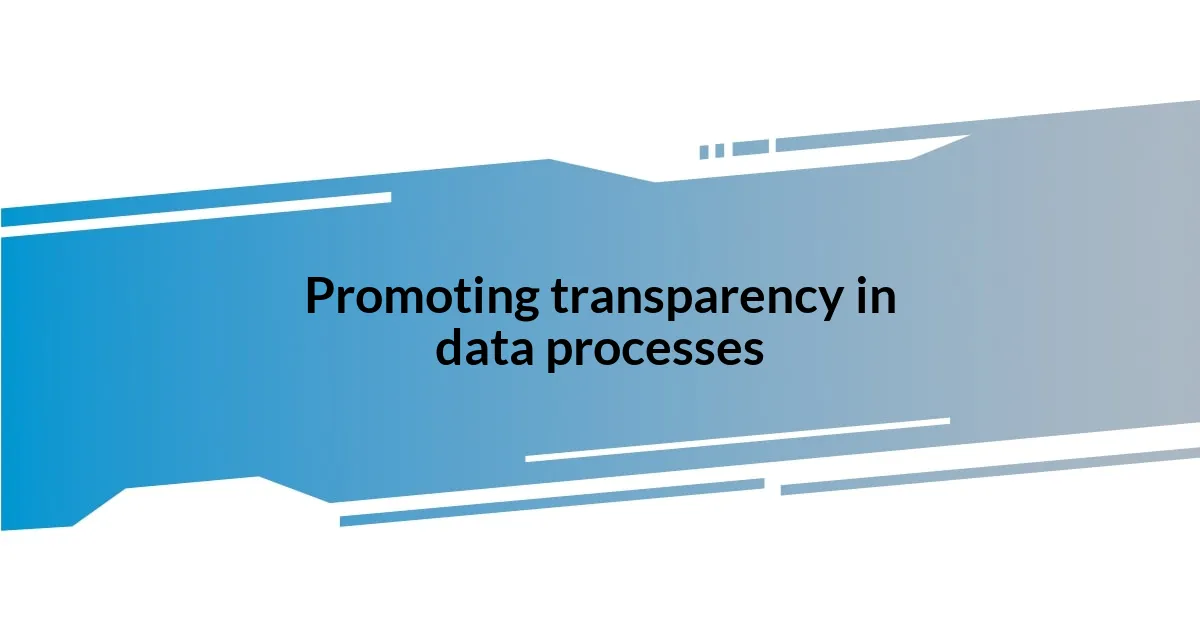
Promoting transparency in data processes
Promoting transparency in data processes is essential for building trust with users. I remember presenting data findings to a team and realizing that without explaining how we collected the data, participants were skeptical about our conclusions. It struck me then: clarity is key. When stakeholders understand the journey of their data—how it’s sourced, how it’s processed—they’re more likely to feel comfortable and invested in the outcomes.
Transparency also means being open about the algorithms and models used in data analysis. I once encountered a scenario where a predictive model was perceived as biased simply because we didn’t adequately explain its workings to our audience. This taught me that a lack of transparency breeds distrust. How often do we take for granted that people understand our processes? I’ve learned that taking the time to demystify our actions can go a long way toward alleviating concerns.
Ultimately, transparency is as much about being open with our audience as it is about holding ourselves accountable. During a project, I found myself in a bind when a dataset didn’t meet ethical standards. Instead of burying the issue, we disclosed our challenges openly, which fostered a constructive dialogue and led to more robust solutions. It reminded me that integrity in our data processes not only strengthens our ethical footing but also enriches the relationships we build with those we serve.
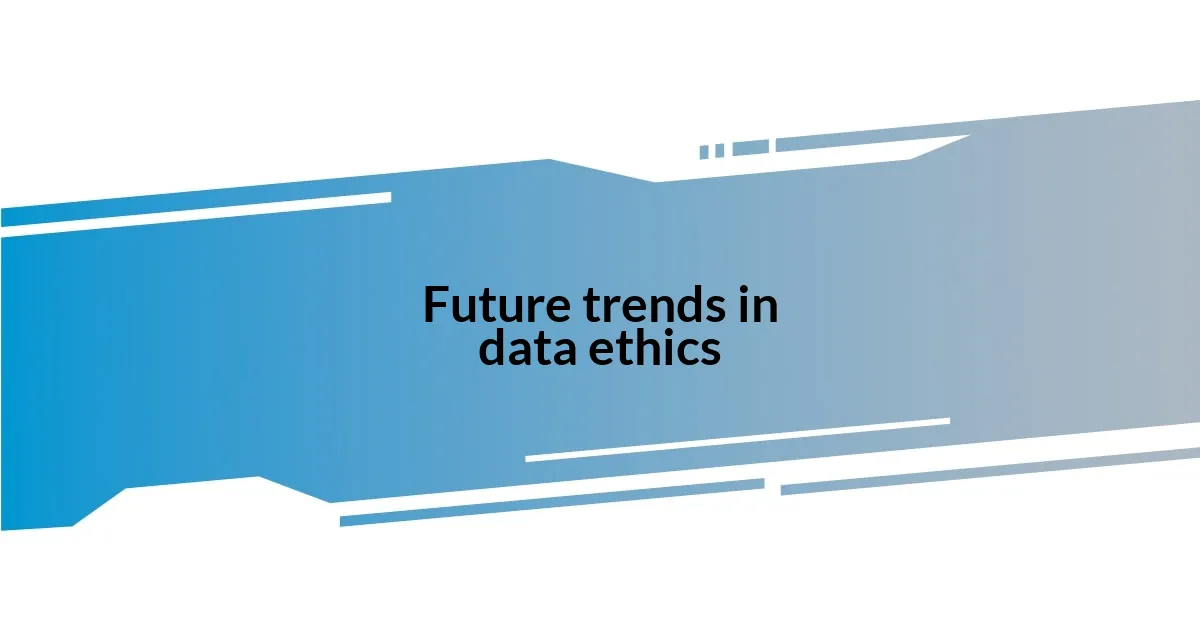
Future trends in data ethics
The future of data ethics is evolving rapidly, and I find myself wondering how organizations will navigate the complexities that lie ahead. For example, as artificial intelligence becomes more integrated into decision-making processes, ethical considerations will have to extend beyond just data collection. I remember reflecting on a project where we implemented machine learning algorithms; it struck me how easily biases can creep in if we aren’t diligent. Will we be prepared to confront the impact of these biases on marginalized communities?
Another trend I foresee is the increasing demand for ethical frameworks that govern data usage. There’s a growing recognition that ethical guidelines must keep pace with innovation. I can’t help but recall a workshop I attended on data governance; it was eye-opening to see industry leaders acknowledge the need for a unified approach. As professionals, we should be asking ourselves: How can we contribute to the creation of these frameworks? Providing a clear structure for ethical data usage could not only enhance compliance but also foster a culture of accountability.
Moreover, the concept of user empowerment is becoming more prominent, transforming the relationship individuals have with their data. It makes me think back to a recent conversation I had with a friend about privacy settings on social media platforms. She was frustrated yet fascinated by how little control she felt she had. This sentiment is echoing more broadly, and I believe we will see an upswing in tools that help users manage their data more effectively. Are we ready to support individuals in reclaiming ownership of their information? Embracing user empowerment in our data practices could redefine trust and commitment between organizations and the communities they serve.